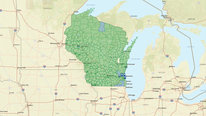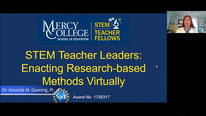- Kristen Stephens
- https://scholars.duke.edu/person/kstephen
- Associate Professor of the Practice
- Presenter’s NSFRESOURCECENTERS
- Duke University
- Susan Wynn
- Faculty
- Presenter’s NSFRESOURCECENTERS
- Duke University
- Alexis Yowell
- Director, Master of Arts in Teaching
- Presenter’s NSFRESOURCECENTERS
- Duke University
Building Reciprocal Relationships: Mentorships to Strengthen and Sustain STEM...
NSF Awards: 1950174
2021 (see original presentation & discussion)
Grades 9-12, Graduate
Duke University's Noyce Scholars Program provides support to STEM teachers during their first three years of teaching. Support is provided through one-on-one mentoring, resources to support professional development, and activities designed to promote work-life balance.
Mathematics, Science, Mentoring
Duke University
Robert Noyce Teacher Scholarship Program (NOYCE)
Related Content for Supporting Early Career STEM Teachers
-
 2021Supporting Teacher Leaders: Milwaukee Master Teachers
2021Supporting Teacher Leaders: Milwaukee Master Teachers
Mike Steele
-
 2020Developing Teacher Leaders with Professional Collaboration
2020Developing Teacher Leaders with Professional Collaboration
Sabrina Stanley
-
 2020VolsTeach for Appalachia: Becoming a STEM teacher
2020VolsTeach for Appalachia: Becoming a STEM teacher
Nick Kim
-
 2021Noyce Capacity Building Project at Bellarmine University
2021Noyce Capacity Building Project at Bellarmine University
Kristin Cook
-
 2021Research-based Methods Course for STEM Teacher Leaders
2021Research-based Methods Course for STEM Teacher Leaders
Amanda Gunning
-
 2015Transforming East Alabama Mathematics (TEAM-Math)
2015Transforming East Alabama Mathematics (TEAM-Math)
Marilyn Strutchens
-
 2021STEM Up NY: Clarkson University Noyce Scholars Program
2021STEM Up NY: Clarkson University Noyce Scholars Program
Seema Rivera
-
 2021Virtual Science Teaching Strategies in Response to Pandemic
2021Virtual Science Teaching Strategies in Response to Pandemic
Sabrina Stanley
This video has had approximately 120 visits by 99 visitors from 59 unique locations. It has been played 42 times as of 05/2023.
Map reflects activity with this presentation from the 2021 STEM For All Video Showcase website, as well as the STEM For All Multiplex website. 
Based on periodically updated Google Analytics data. This is intended to show usage trends but may not capture all activity from every visitor.
show more
Discussion from the 2021 STEM For All Video Showcase (17 posts)



Anne Kern
Professor
Hello Duke Noyce team,
Supporting science teachers through a cohort, it an amazing networking opportunity. I still work with many of the teachers I met in a cohort almost 25 years ago and a number of us are not in the classroom anymore!
I am curious if there are other topics that you need to include in your mentoring program, besides science pedagogy and instruction. And if so what some of those topics?
Cheers,
Anne
Kristen Stephens
Associate Professor of the Practice
Hi Anne - Thank you for your comments. The topics we address through the mentoring component of our program have varied over the years as the needs of early career teachers have fluctuated. Initially, classroom management, culturally responsive pedagogy, and teaching for social justice were topics of great interest among our Noyce Scholars. In recent years, the focus has shifted to maintaining a work/life balance and addressing issues of anxiety and stressors within the profession (even before COVID). The topics are fluid and largely driven by the mentees. Thanks for your question! Kristen
Anne Kern
Professor
Interesting-what work/life balance skills do you teach?
Kristen Stephens
Associate Professor of the Practice
Anne - Through our mindfulness training, the following areas are addressed: sensory clarity, stress reduction, behavior change, greater happiness, improving relationships, insight & self-knowledge, attention to relaxation, cultivating positive emotions, and many more.
Kelly Costner
I'm curious about the mindfulness training: Are you conducting that as an "in-house" offering (as in an on-campus trainer) or do you have participants involved with an outside provider?
Kristen Stephens
Associate Professor of the Practice
We used an outside provider, though the company was founded by two Duke graduates, so it had an in-house feel. The provider's website is https://liveahb.com/
Katherine Shorten
Hello Duke Noyce Team,
This work is close to my heart. Our Noyce program at MSU Denver has a near-peer mentoring component that has been invaluable retention and growth of our math and science teachers. I believe social-emotional support is what our Scholars most value.
Best,
Katherine
Kristen Stephens
Associate Professor of the Practice
Hi Katherine! I agree. Providing social-emotional support to teachers has been particularly important this past year due to COVID and the sudden pivot to online teaching. I hope we continue to find real value in proactively addressing SEL as we return to in-person instruction. Thank you for sharing your thoughts. Kristen.
Ann Cavallo
Assistant Vice Provost and Director, CRTLE
Nice project! Mentoring is so important to teacher preparation, induction, and retention so it is great to see mentoring as central to your program. Are you able to select mentor teachers to match with your Scholars or does the school district select them? Also, what are some techniques you are using to evaluate the outcomes of your program?
Kristen Stephens
Associate Professor of the Practice
Hi Ann - Since our program is small --- approximately 5 Noyce scholars a year--- we are able to hand-pick our mentors. Additionally, since we have had a Noyce program for 10+ years, many of our former Noyce scholars have been in the classroom long enough to serve as mentors themselves---so it is a close-knit community.
In terms of outcomes, we use several measures including annual focus groups and surveys. The surveys allow us to track scholars across their teaching career on a variety of indicators: K-12 student growth, teaching awards and leadership positions, and perceived quality of their preparation at Duke across a range of areas.
Ann Cavallo
Cassandra Bell
We too have had a Noyce program for 10+ years and are seeing the benefits of our alumni Noyce Scholars serving as mentor teachers during internships--it is really great to see them giving back and supporting teacher candidates!
Kristen Stephens
Associate Professor of the Practice
Cassandra - I agree. The strong network and sense of community that we have been able to build has certainly enriched our program. It’s great to see our scholars grow throughout their careers and support and welcome new teachers into the fold.
Ann Cavallo
Assistant Vice Provost and Director, CRTLE
Great that you can select your mentors and that many if not all are your own graduates - this helps both the mentors and the scholars stay in contact and continue with professional development. Keeping the close-knit learning community I am sure helps with teacher induction and retention too. Thank you!
James Callahan
Thank you very much on the video. I specifically wanted to find videos to highlight for the schools we work about programs that focus on early career teacher support. This is clearly a perfect match -- a highly reputable and well proven.
When sharing the links, does it make sense that I also include the complementary Noyce Project Videos of previous years? For instance:
https://www.nsfnoyce.org/noyce-project-videos/&...
As we move into 2022, the link to this page will move into that updated page, yes? You all handle so beautifully cross linking and making more excellent materials accessible. Thank you!
Elizabeth Allan
Professor; Secondary Science Education Program Coordinator
Supporting the socioemotional health and strong work/life balance of early career teachers has always been important but it seems that the pandemic brought it to the forefront. What practices will you take forward from this year and how will you measure the effectiveness of those you do?
Kristen Stephens
Associate Professor of the Practice
Hi Elizabeth - We had planned to focus on maintaining work/life balance through mindfulness training prior to the pandemic.... It just happened to be an even more timely focus once COVID hit us. In terms of outcomes, we use several measures including annual focus groups and surveys. The surveys allow us to track scholars across their teaching career on a variety of indicators: K-12 student growth, teaching awards and leadership positions, and perceived quality of their preparation at Duke across a range of areas. We are also interested in the ways that teachers may share mindfulness strategies with their own students and how these strategies have help them better manage stress.
Rita Hagevik
Yes mentoring is so important. NSTA has ementoring now too!
Jill Rhoden
Further posting is closed as the event has ended.